- Home
- John Irving
The Fourth Hand
The Fourth Hand Read online
MORE PRAISE FOR
The Fourth Hand
"Full of virtual slapstick and betimes topsy-turvy ... A land of love: a geography of catastrophes big and small, a world where the real news is the story of our redemption, always unlikely, by the unlikely."
-- Miami Herald
"Joyfully exotic ... You're likely to find yourself shaking with laughter."
-- The Seattle Times
"A turbocharged plot and outsized heroes and villains [who] will delight fans ... In The Fourth Hand, as in his past works, [Irving] aims to tell a sweeping narrative with big, poignant themes, and he succeeds with brio."
-- Elle
"Irving uses his characters' frailties to his advantage, creating a poignant fable of redemption and hope."
-- Us Weekly
"The Fourth Hand jumps from page to page, the prose exploding with sarcasm, firing bullets at a modern culture of disaster heroes, misguided journalism, and silver-screen philosophy."
-- Boston Magazine
"An unconventional tale of love between a womanizing disaster-story reporter whose forearm is chewed off by a lion and the woman who donates her husband's hand to him. As oddly moving as Irving's previous work, with characters who linger in the memory."
-- Vogue
"A touch of the bizarre has always enlivened Irving's work, and here he outdoes himself in spinning grotesque incident into a dramatic story brimming with humor, sexual shenanigans, and unexpected poignancy.... This fast-paced novel will do more than please Irving's numerous fans-- it will garner him new ones."
-- Publishers Weekly (starred review)
"Irving [cuts] loose with his sexual slapstick in hilarious, Garp-like fashion."
--Maxim
"Compulsively readable ... Classic Irving ... This is one crazy but sweet little love story."
-- Booklist
ALSO BY JOHN IRVING
BOOKS
Setting Free the Bears
The Water-Method Man
The 158-Pound Marriage
The World According to Garp
The Hotel New Hampshire
The Cider House Rules
A Prayer for Owen Meany
Trying to Save Piggy Sneed
A Son of the Circus
The Imaginary Girlfriend
A Widow for One Year
My Movie Business
SCREENPLAYS
The Cider House Rules
For
Richard Gladstein
and
Lasse Hallstrom
"... a person who is looking for something doesn't travel very fast."
--the telephone repairman in
E. B. White's Stuart Little
CONTENTS
1. The Lion Guy
2. The Former Midfielder
3. Before Meeting Mrs. Clausen
4. A Japanese Interlude
5. An Accident on Super Bowl Sunday
6. The Strings Attached
7. The Twinge
8. Rejection and Success
9. Wallingford Meets a Fellow Traveler
10. Trying to Get Fired
11. Up North
12. Lambeau Field
CHAPTER ONE
The Lion Guy
IMAGINE A YOUNG MAN on his way to a less-than-thirty-second event--the loss of his left hand, long before he reached middle age.
As a schoolboy, he was a promising student, a fair-minded and likable kid, without being terribly original. Those classmates who could remember the future hand recipient from his elementary-school days would never have described him as daring. Later, in high school, his success with girls notwithstanding, he was rarely a bold boy, certainly not a reckless one. While he was irrefutably good-looking, what his former girlfriends would recall as most appealing about him was that he deferred to them.
Throughout college, no one would have predicted that fame was his destiny. "He was so unchallenging," an ex-girlfriend said.
Another young woman, who'd known him briefly in graduate school, agreed. "He didn't have the confidence of someone who was going to do anything special" was how she put it.
He wore a perpetual but dismaying smile--the look of someone who knows he's met you before but can't recall the exact occasion. He might have been in the act of guessing whether the previous meeting was at a funeral or in a brothel, which would explain why, in his smile, there was an unsettling combination of grief and embarrassment.
He'd had an affair with his thesis adviser; she was either a reflection of or a reason for his lack of direction as a graduate student. Later--she was a divorcee with a nearly grown daughter--she would assert: "You could never rely on someone that good-looking. He was also a classic underachiever--he wasn't as hopeless as you first thought. You wanted to help him. You wanted to change him. You definitely wanted to have sex with him."
In her eyes, there would suddenly be a kind of light that hadn't been there; it arrived and departed like a change of color at the day's end, as if there were no distance too great for this light to travel. In noting "his vulnerability to scorn," she emphasized "how touching that was."
But what about his decision to undergo hand-transplant surgery? Wouldn't only an adventurer or an idealist run the risk necessary to acquire a new hand?
No one who knew him would ever say he was an adventurer or an idealist, but surely he'd been idealistic once. When he was a boy, he must have had dreams; even if his goals were private, unexpressed, he'd had goals.
His thesis adviser, who was comfortable in the role of expert, attached some significance to the loss of his parents when he was still a college student. But his parents had amply provided for him; in spite of their deaths, he was financially secure. He could have stayed in college until he had tenure--he could have gone to graduate school for the rest of his life. Yet, although he'd always been a successful student, he never struck any of his teachers as exceptionally motivated. He was not an initiator--he just took what was offered.
He had all the earmarks of someone who would come to terms with the loss of a hand by making the best of his limitations. Everyone who knew him had him pegged as a guy who would eventually be content one-handed.
Besides, he was a television journalist. For what he did, wasn't one hand enough?
But he believed a new hand was what he wanted, and he'd alertly understood everything that could go medically wrong with the transplant. What he failed to realize explained why he had never before been much of an experimenter; he lacked the imagination to entertain the disquieting idea that the new hand would not be entirely his. After all, it had been someone else's hand to begin with.
How fitting that he was a television journalist. Most television journalists are pretty smart--in the sense of being mentally quick, of having an instinct to cut to the chase. There's no procrastination on TV. A guy who decides to have hand-transplant surgery doesn't dither around, does he?
Anyway, his name was Patrick Wallingford and he would, without hesitation, have traded his fame for a new left hand. At the time of the accident, Patrick was moving up in the world of television journalism. He'd worked for two of the three major networks, where he repeatedly complained about the evil influence of ratings on the news. How many times had it happened that some CEO more familiar with the men's room than the control room made a "marketing decision" that compromised a story? (In Wallingford's opinion, the news executives had completely caved in to the marketing mavens.)
To put it plainly, Patrick believed that the networks' financial expectations of their news divisions were killing the news. Why should news shows be expected to make as much money as what the networks called entertainment? Why should there be any pressure on a news division even to make a profit? News wasn't what happened in Holl
ywood; news wasn't the World Series or the Super Bowl. News (by which Wallingford meant real news--that is, in-depth coverage) shouldn't have to compete for ratings with comedies or so-called dramas.
Patrick Wallingford was still working for one of the major networks when the Berlin Wall fell in November 1989. Patrick was thrilled to be in Germany on such a historic occasion, but the pieces he filed from Berlin were continually edited down--sometimes to half the length he felt they deserved. A CEO in the New York newsroom said to Wallingford: "Any news in the foreign-policy category is worth shit."
When this same network's overseas bureaus began closing, Patrick made the move that other TV journalists have made. He went to work for an all-news network; it was not a very good network, but at least it was a twenty-four-hour international news channel.
Was Wallingford naive enough to think that an all-news network wouldn't keep an eye on its ratings? In fact, the international channel was overfond of minute-by-minute ratings that could pinpoint when the attention of the television audience waxed or waned.
Yet there was cautious consensus among Wallingford's colleagues in the media that he seemed destined to be an anchor. He was inarguably handsome--the sharp features of his face were perfect for television--and he'd paid his dues as a field reporter. Funnily enough, the enmity of Wallingford's wife was chief among his costs.
She was his ex-wife now. He blamed the travel, but his then-wife's assertion was that other women were the problem. In truth, Patrick was drawn to first-time sexual encounters, and he would remain drawn to them, whether he traveled or not.
Just prior to Patrick's accident, there'd been a paternity suit against him. Although the case was dismissed--a DNA test was negative--the mere allegation of his paternity raised the rancor of Wallingford's wife. Beyond her then-husband's flagrant infidelity, she had an additional reason to be upset. Although she'd long wanted to have children, Patrick had steadfastly refused. (Again he blamed the travel.)
Now Wallingford's ex-wife--her name was Marilyn--was wont to say that she wished her ex-husband had lost more than his left hand. She'd quickly remarried, had got pregnant, had had a child; then she'd divorced again. Marilyn would also say that the pain of childbirth--notwithstanding how long she'd looked forward to having a child--was greater than the pain Patrick had experienced in losing his left hand.
Patrick Wallingford was not an angry man; a usually even-tempered disposition was as much his trademark as his drop-dead good looks. Yet the pain of losing his left hand was Wallingford's most fiercely guarded possession. It infuriated him that his ex-wife trivialized his pain by declaring it less than hers in "merely," as he was wont to say, giving birth.
Nor was Wallingford always even-tempered in response to his ex-wife's proclamation that he was an addicted womanizer. In Patrick's opinion, he had never womanized. This meant that Wallingford didn't seduce women; he simply allowed himself to be seduced. He never called them--they called him. He was the boy equivalent of the girl who couldn't say no--emphasis, his ex-wife would say, on boy. (Patrick had been in his late twenties, going on thirty, when his then-wife divorced him, but, according to Marilyn, he was permanently a boy.)
The anchor chair, for which he'd seemed destined, still eluded him. And after the accident, Wallingford's prospects dimmed. Some CEO cited "the squeamish factor." Who wants to watch their morning or their evening news telecast by some loser-victim type who's had his hand chomped off by a hungry lion? It may have been a less-than-thirty-second event--the entire story ran only three minutes--but no one with a television set had missed it. For a couple of weeks, it was on the tube repeatedly, worldwide.
Wallingford was in India. His all-news network, which, because of its penchant for the catastrophic, was often referred to by the snobs in the media elite as "Disaster International," or the "calamity channel," had sent him to the site of an Indian circus in Gujarat. (No sensible news network would have sent a field reporter from New York to a circus in India.)
The Great Ganesh Circus was performing in Junagadh, and one of their trapeze artists, a young woman, had fallen. She was renowned for "flying"--as the work of such aerialists is called--without a safety net, and while she was not killed in the fall, which was from a height of eighty feet, her husband/trainer had been killed when he attempted to catch her. Although her plummeting body killed him, he managed to break her fall.
The Indian government instantly declared no more flying without a net, and the Great Ganesh, among other small circuses in India, protested the ruling. For years, a certain government minister--an overzealous animal-rights activist--had been trying to ban the use of animals in Indian circuses, and for this reason the circuses were sensitive to government interference of any kind. Besides--as the excitable ringmaster of the Great Ganesh Circus told Patrick Wallingford, on-camera--the audiences packed the tent every afternoon and night because the trapeze artists didn't use a net.
What Wallingford had noticed was that the nets themselves were in shocking disrepair. From where Patrick stood on the dry, hard-packed earth--on the "floor" of the tent, looking up--he saw that the pattern of holes was ragged and torn. The damaged net resembled a colossal spiderweb that had been wrecked by a panicked bird. It was doubtful that the net could support the weight of a falling child, much less that of an adult.
Many of the performers were children, and these mostly girls. Their parents had sold them to the circus so they could have a better (meaning a safer) life. Yet the element of risk in the Great Ganesh was huge. The excitable ringmaster had told the truth: the audiences packed the tent every afternoon and night to see accidents happen. And often the victims of these accidents were children. As performers, they were talented amateurs--good little athletes--but they were spottily trained.
Why most of the children were girls was a subject any good journalist would have been interested in, and Wallingford--whether or not one believed his ex-wife's assessment of his character--was a good journalist. His intelligence lay chiefly in his powers of observation, and television had taught him the importance of quickly jumping ahead to what might go wrong.
The jumping-ahead part was both what was brilliant about and what was wrong with television. TV was driven by crises, not causes. What chiefly disappointed Patrick about his field assignments for the all-news network was how common it was to miss or ignore a more important story. For example, the majority of the child performers in an Indian circus were girls because their parents had not wanted them to become prostitutes; at worst, the boys not sold to a circus would become beggars. (Or they would starve.)
But that wasn't the story Patrick Wallingford had been sent to India to report. A trapeze artist, a grown woman hurtling downward from eighty feet, had landed in her husband's arms and killed him. The Indian government had intervened--the result being that every circus in India was protesting the ruling that their aerialists now had to use a net. Even the recently widowed trapeze artist, the woman who'd fallen, joined in the protest.
Wallingford had interviewed her in the hospital, where she was recovering from a broken hip and some nonspecific damage to her spleen; she told him that flying without a safety net was what made the flying special. Certainly she would mourn her late husband, but her husband had been an aerialist, too--he'd also fallen and had survived his fall. Yet possibly, his widow implied, he'd not really escaped that first mistake; her falling on him had conceivably signified the true conclusion of the earlier, unfinished episode.
Now that was interesting, Wallingford thought, but his news editor, who was cordially despised by everyone, was disappointed in the interview. And all the people in the newsroom in New York thought that the widowed trapeze artist had seemed "too calm;" they preferred their disaster victims to be hysterical.
Furthermore, the recovering aerialist had said her late husband was now "in the arms of the goddess he believed in"--an enticing phrase. What she meant was that her husband had believed in Durga, the Goddess of Destruction. Most of the trapeze arti
sts believed in Durga--the goddess is generally depicted as having ten arms. The widow explained: "Durga's arms are meant to catch and hold you, if you ever fall."
That was interesting to Wallingford, too, but not to the people in the newsroom in New York; they said they were "sick of religion." Patrick's news editor informed him that they had run too many religious stories lately. What a dick, Wallingford thought. It didn't help that the news editor's name was Dick.
He'd sent Patrick back to the Great Ganesh Circus to acquire "additional local color." Dick had further reasoned that the ringmaster was more outspoken than the trapeze artist.
Patrick had protested. "Something about the child performers would make a better story," he said. But apparently they were also "sick of children" in New York.
"Just get more of the ringmaster," Dick advised Wallingford.
In tandem with the ringmaster's excitement, the lions in their cage--the lions were the background for the last interview--grew restless and loud. In television terms, the piece that Wallingford was filing from India was the intended "kicker," the show-ender. The lions would make the story an even better kicker if they roared loudly enough.
It was meat day, and the Muslims who brought the meat had been delayed. The television truck and the camera and sound equipment--as well as the cameraman and the female sound technician--had intimidated them. The Muslim meat wallahs had been frozen in their tracks by so much unfamiliar technology. But primarily it was the sight of the female sound technician that had halted them.
A tall blonde in tight blue jeans, she wore headphones and a tool belt with what must have struck the meat wallahs as an assortment of male-looking accessories: either pliers or a pair of wire cutters, a bunch of clamps and cables, and what might have been a battery-tester. She was also wearing a T-shirt without a bra.
Wallingford knew that she was German because he'd slept with her the night before. She'd told him about the first trip she took to Goa--she was on vacation, traveling with another German girl, and they'd both decided that they never wanted to live anywhere but India.
The other girl got sick and went home, but Monika had found a way to stay in India. That was her name--"Monika with a k," she'd told him. "Sound technicians can live anywhere," she had declared. "Anywhere there's sound."

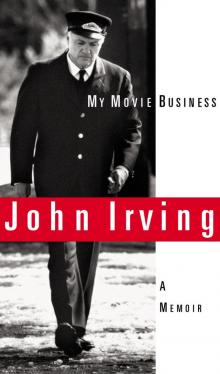 My Movie Business: A Memoir
My Movie Business: A Memoir In One Person
In One Person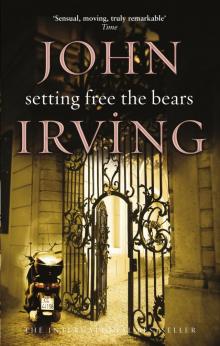 Setting Free the Bears
Setting Free the Bears The Fourth Hand
The Fourth Hand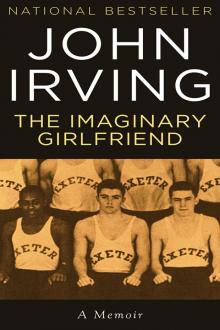 The Imaginary Girlfriend
The Imaginary Girlfriend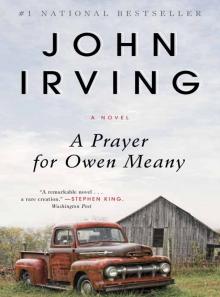 A Prayer for Owen Meany
A Prayer for Owen Meany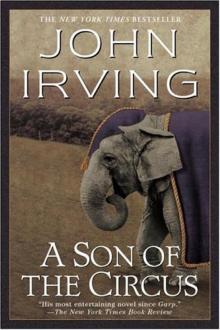 A Son of the Circus
A Son of the Circus Last Night in Twisted River
Last Night in Twisted River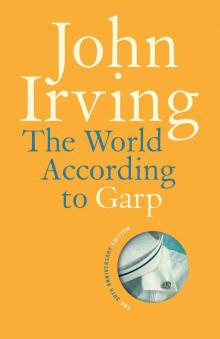 The World According to Garp
The World According to Garp The Cider House Rules
The Cider House Rules The Hotel New Hampshire
The Hotel New Hampshire The 158-Pound Marriage
The 158-Pound Marriage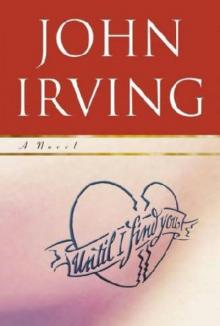 Until I Find You
Until I Find You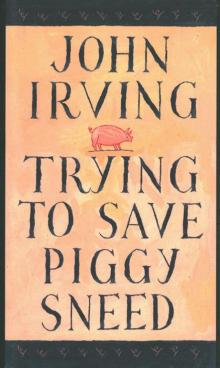 Trying to Save Piggy Sneed
Trying to Save Piggy Sneed Cider House Rules
Cider House Rules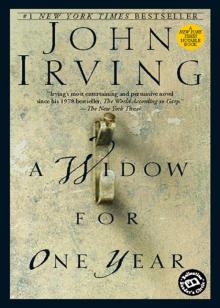 A Widow for One Year
A Widow for One Year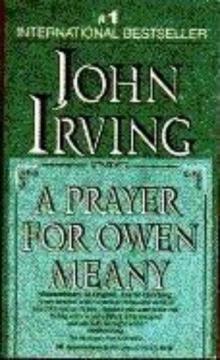 A prayer for Owen Meany: a novel
A prayer for Owen Meany: a novel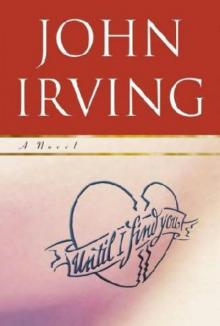 (2005) Until I Find You
(2005) Until I Find You